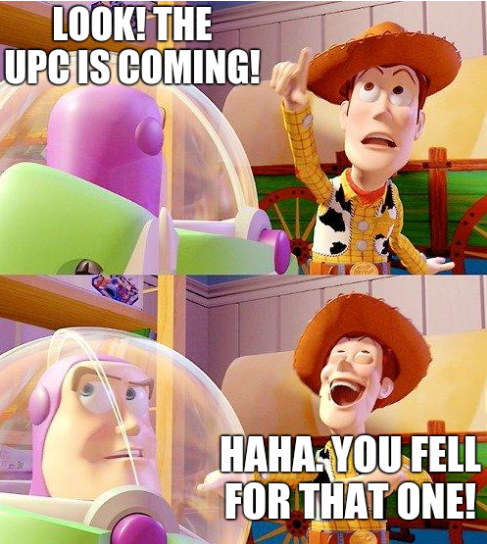

YESTERDAY we were told that "tomorrow [there would be an] important PR to nuke the UPC as it is..."
"People deserve realistic expectations; UPC propaganda may help “sales”, but at whose expense?"Readers may have noticed a slight decrease in our coverage of European Patent Office (EPO) affairs. But we're still watching it very closely and our latest Daily Links (published minutes ago) included a report about EPO-granted patent being found invalid, more patents granted on nature/life, and hearing delays due to the infamous pandemic (this affects EUIPO and EPO alike). This does not concern Team Campinos/Battistelli and it's not about software patents , so we don't have much to say about that.
On the other hand, yesterday we found this promotion of an article by Rachel Bradley (Penningtons Manches Cooper LLP). She either does not understand how deep in trouble UPC is or she is simply lying to clients for patent revenue (legal bills) to be secured, based on unhelpful delusions. Here's what she wrote in the firm's site (with our corrections added):
How will it affect patent portfolios?
Currently patents within the European Patent Convention (EPC) countries are taken to grant through the European Patent Office (EPO). The EPC is not an EU instrument but an international convention and the EPO itself is not a European institution. As such, the procedure and mechanisms for granting classic European Patents will remain unchanged for the UK.
The big question is, how will the proposed Unitary Patent system be affected by Brexit?
The UK intends tostay[Ed: you cannot stay in something that does even exist] in the Unitary Patent system, and indeed it ratified the Unitary Patent Court Agreement in April 2018 [Ed: and the person who was responsible for that stunt resigned, then replaced twice or thrice more]. The Unified Patent Court and Unitary Patent will [Ed: "will" or "would"? Well, the word "will" implies certainty] take effect three months after the UPC Agreement has been ratified by thirteen countries including all three of France, Germany and the UK [Ed: we know the UK cannot participate, Germany is not ratifying and France has self-interest because of positions being reserved to it; also, constitutional challenges -- of which there have been several -- can annul some of the other ratifications]. France has also already ratified it [Ed: see EPO scandals and our coverage for associated scandals; INPI is now under fire as well] along with a further 14 countries [Ed: there have been court cases standing in the way though], meaning there are now 16 ratifications in total [Ed: of which several are invalid, including critical ones]. Although Germany has passed all the laws that are needed to bring the UPC into effect in Germany [Ed: meaningless bureaucracy, also unconstitutional], ratification is still outstanding [Ed: outstanding implies almost "impending"; not true] and is dependent on the outcome of a complaint pending before the German Constitutional Court [Ed: no, Berlin has already said that due to Brexit there are additional barriers and reservations]. It is possible, if the Court dismisses the complaint, enabling Germany to ratify the UPC Agreement [Ed: no, there's also Brexit], that the UPC system will take effect during the transition period up until December 2020 [Ed: completely unrealistic nonsense, probably a copy-paste from some Team UPC site like the Preparatory Committee], with the UK as a participating member [Ed: no, it cannot participate as it's an EU system].
As currently drafted, the UPC Agreement can only take effect in EU member states and the UPC cannot be based in a non-EU member state [Ed: to change that they need to rewrite the whole thing and start a round of ratifications all over again, which can take years and become unattractive without London]. There has been much debate on the question of whether legally the UK could continue to participate in the UP and UPC [Ed: it cannot, they need to restart to have a chance], and the weight of opinion is that it could [Ed: whose opinion? The Preparatory Committee's?], if the political will is there [Ed: no, they mean lobbying, bribery and so on]. Continued participation in the UPC and UP would require a new international agreement between the UK and the participating EU member states, and would require the UK to submit to EU law, and the supervisory jurisdiction of the European Court of Justice (CJEU), in relation to proceedings before the UPC [Ed: then, still, the UPC needs to be redone, rewritten, ratified all over again; It won't even be "UPC" anymore but something else]. The UK would also have to sign up to an appropriate jurisdiction and enforcement regime, such as the Lugano Convention. [Ed: This is unlikely given recent statements from Number 10]